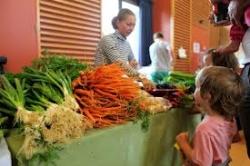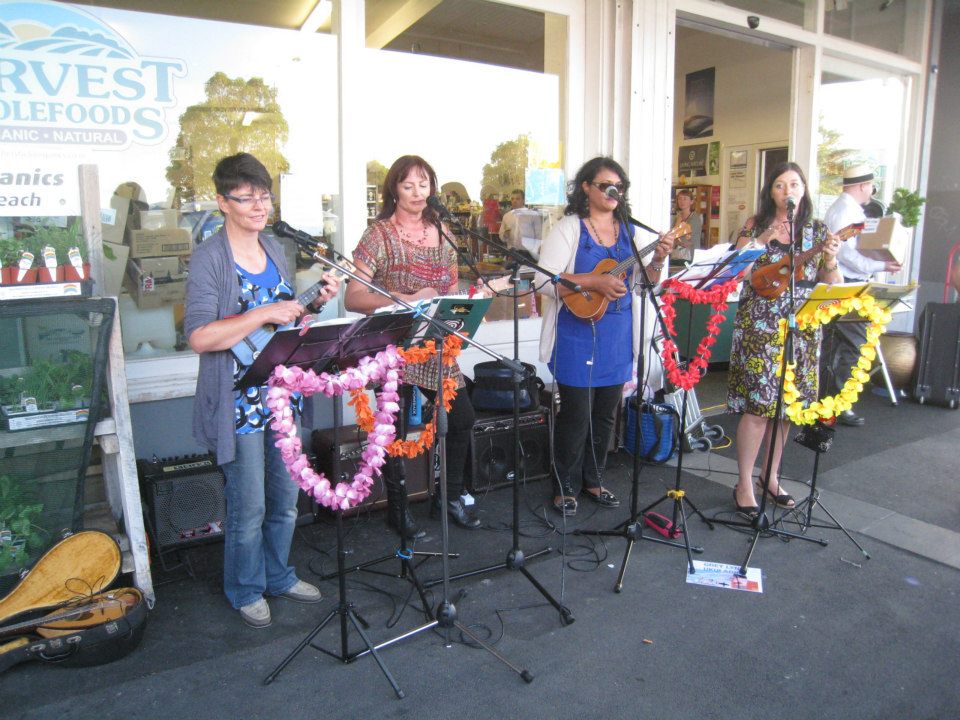Transition Towns and The Problem
The two toughest challenges facing humankind at the start of this 21st century are Climate Change and Peak Oil. Recently is seems as though we should add "economic crisis" to this list. In reality, all these problems are very much symptoms of a single root issue. We live on a finite planet, and we often act as though we don't. When we live beyond the ability of the planet to sustain us, it's very much like paying our mortgage with nothing but credit cards. It might work for a little while, but eventually the debt catches up to you. For a while, scientists have been saying that it may not be us who pays the debt, but it will certainly be our children. Now, it seems very clear that it will indeed be us who feels immediate effects, and there's no time to waste in acting.
Environmentalists often talk about things being "sustainable". Sometimes, it's easy to hear the word sustainable and think that it just means "being green", "loving nature", and so on. Of course, sustainable actually means "able to be continued". Is my business model sustainable? My ability to put a roof over my head, and feed my children? Is our civilisation sustainable, that is, able to be continued for our children and our children's children and so on? These are the real questions about sustainability, and they are important regardless of whether you love forests or concrete, or vote National, Labour or Green. Sustainability is about human survival.
We mentioned two big challenges, Climate Change and Peak Oil. You probably know a lot about climate change by now. There is no dispute that the earth's climate is changing. It's not all about warming up either. Weather patterns are becoming more erratic. Floods and cyclones are as much as part of climate change as droughts and bushfires. We know too that climate change is caused by too much carbon dioxide in the atmosphere. A while back, the consensus of scientists was that anything over 350 parts per million of CO2 in the atmosphere would lead to more warming of the planet than was safe. We've already passed that limit, and things are getting worse.
Peak Oil is less well known. Peak oil is not about running out of oil. Ever since we first started extracting oil from the ground, we've drilled more and more wells, and consumed more and more of the stuff. The more we had, the more we wanted, and the oil suppliers have been able to oblige by finding more and more oil fields. We have a lot of oil being pumped out of the ground right now, but the discoveries of new oil fields have long been in decline. We can keep pumping it out of the ground, but we can't keep pumping more and more oil each year than the year before. Oil isn't renewed, it formed about 200 million years ago and it's not being made as we speak, and so eventually we have to reach the point where we only extract about the same amount as we extracted last year. From that point on, each year we get slightly less than the year before. We've seen this happen in individual countries (like the USA, which was the world's largest oil producer until it peaked in 1971), and we're starting to see it happen world wide.
The peak doesn't mean that the petrol stations don't have oil for you anymore. It just means that from now on, we can't rely on constant growth. Constant growth has been the underpinning of our entire economy (I did say that this was connection to the economy), and as oil supplies start to slowly shrink, we're in for a shock. Peak oil is important to our planning for the future, because we have to consider having less and less available oil energy each year when we plan what to do about climate change. Want to run the world on wind turbines? Well, we need to think about where the energy comes from. When we think about Peak Oil and Climate Change at the same time, we get a much better idea of what the possible solutions can be.
The Solution
It's great to hear scientists working away on new technologies, and governments signing climate agreements, but these things are only a small part of the solution, and it's pretty apparent to everyone that they aren't going to be even nearly enough. These national and international level solutions generally seem out of our hands, and we feel powerless to effect the change that scientists tell us is necessary.
Individual solutions, on the other hand, like changing our light-bulbs, aren't proving as effecting as we'd like, and it's really hard work to make life changes without the help our friends, neighbours and employers.
In between personal changes and global changes, lies local change. At the local level, we really can make the world a better place in a way that supports us and enriches our lives, but is also small enough that a few people can make a visible difference. It also turns out that the main solution to some of the problems we face is localisation.
In times gone by, everything that a local area needed to survive was produced locally, and then if there was the ability to trade further abroad, then this was used to bring in luxury items to improve people's lives. We might say that a local town made it's cake locally and imported the cherry on top. These days, our local communities are not equipped to meet our basic needs. and we could be said to import the cake, and make the cherry locally (if we're lucky). This reliance on globalisation leaves us in a dangerous position. If the wheels of globalisation aren't turning so well, perhaps because of the price of oil, an economic crisis, natural disasters, political changes, or whatever, then we're exposed to tremendous shocks to our way of life.
Our ability to resist shocks is called Resilience. We need our communities to be resilient, so that even if there are shocks, we can all at least be warm and fed, housed and employed. So, localisation isn't about returning to quaint country villages. It's about communities that are Resilient. My ipod might come from China, but I need my food, and my house, and my other basic needs, to come from my local area. That way, if there is some sort of supply shock, I can live without a new ipod for a bit, but I don't have to live without food.
The Process
The process used by Grey Lynn 2030 is one of working our way towards that resilient local community that we envisage. At its core it involves building up a design collectively of how our neighbourhood could look if it supplied more of its own needs, and relied less on oil and imported products, and contributed less to climate change emissions. Since we're preparing for a world with less available energy (that's fuel energy, not enthusiasm), then we call this our Energy Descent Action Plan. It's a plan, because it's not just a picture of what we'd like to look like in 20 years time, it's also a guide for how we're going to get there. Once we've built up our design, we back-cast it to the present day, so that we can see the changes that have to be made each year to arrive at our goal.
Grey Lynn 2030 is certainly not just about dreaming, we want to help create concrete examples of local resilience that really help people in our area right now.
We are forming focus groups, which you can be a part of, to help shape aspects of our community vision which you're passionate about.
These could be any groups we like, but some groups that other local Transition Initiatives have formed include:
- Building & Housing
- Economics & Livelihoods
- Education
- Energy
- Food
- Health & Wellbeing
- Heart & Soul
- Local Government
- The Arts
- Transport
The global Transition movement doesn't provide a prescriptive formula, but it does provide a huge amount of resources and examples, enough to get you excited about others around the world are doing to make their communities more resilient.
Rob Hopkins is the "founder" of the Transition Towns movement.
![]()
His web site is very informative and inspiring.
Here is a link to a short clip to Rob speaking about the Transition Towns movement.
This article will also give you a quick insight into the Transition Towns concepts which Grey Lynn 2030 is part of.
Townsfolk prepare for life after oil
LONDON, England (CNN) -- Imagine a life where each morning you cycle to work, and come home at night to tend your allotment and eat a dinner of locally produced food.

In order to move to a zero-carbon lifestyle, livestock and produce will need to be locally sourced.
Maybe after your meal you take a walk down the car-free streets to the nearest bar where you buy a round of drinks with locally produced currency and settle down in a corner to watch a troupe of musicians play some local folk music.
It might sound like some kind of fairytale arcadia -- a return to the simple lives of our forefathers, before fossil fuels and consumer culture turned everything on its head.
In fact this is how many people are beginning to envision our future -- a world where we come to terms with inevitable fuel shortages and work towards a less energy-dependent lifestyle.
This vision has found a voice in the "transition initiative," a movement that encourages towns, villages and cities across the world to begin the process of preparing themselves for a carbon-free world.
Transition Initiative Resources:
Rob Hopkin's website was: http://transitionculture.org/
Now https://www.robhopkins.net/
Transition Network: http://transitiontowns.org/
Transition Towns
Blog posts relating directly to Transistion towns
Rob Hopkins: “Happy 10th birthday Grey Lynn 2030 Transition Community!”
We wish to thank Rob Hopkins, co-founder of the Transition movement, for his wonderful words and sharing his message with us in celebration of our anniversary: “Happy 10th birthday Grey Lynn 2030 Transition Community!”. Enjoy: https://youtu.be/50z7j6maVFI About Rob: Rob Hopkins, PhD, Co-founder of both Transition Town Totnes and Transition Network. He is an Ashoka Fellow,…
Read MoreTaking Transition Towns to the Town Hall
One of the characteristics of the transition town movement (of which Grey Lynn 2030 is part) is recognition of the need to develop a positive and productive relationship with local government. This relationship is seen as essential to progressing plans, projects and securing funding for local initiatives. Since being established in 2008 Grey Lynn 2030…
Read MoreEstablishing and Growing a Transition Town Group with Auckland Council
Would you like to set up a Transition Town in your area or are you already part of an existing Transition community and like to network and share learnings with other groups? Transition Towns is a vibrant, international grassroots movement with a framework that communities can use to create positive solutions to the converging environmental,…
Read MoreAuckland Transition Towns Gathering 14th April
Want to get a Transition Town going in your suburb or community? On the 14th of April you are invited to learn about Growing Sustainable Communities, an introduction to Transition Towns. This presentation is the first of two Transition Town events being supported by Auckland Council in conjunction with the Mt Eden Village People (Transition…
Read MoreGrey Lynn 2030 Fundraiser- The Water Whisperers, Tangaroa
Grey Lynn 2030 Movie Night Fundraiser Positive Vision – Practical action: Help us do more! Wednesday 6th October Capitol Cinema 610 Dominion Road, Balmoral 7.30pm for a glass of wine 8pm movie start We are thrilled to be hosting the Auckland Premier of the Water Whisperers Tangaroa Kathleen Gallagher award winning Director of Earth Whisperers…
Read MoreGrey Lynn 2030 first update for 2010
1 February 2010 In This Issue: Have your say on the Super city Grey Lynn 2030 first gathering of the year Grey Lynn Farmers Market Traffic Calming West Lynn Parking Issues Waste Away Wilton Street Community Gardens update Grey Lynn 2030 “sustainability” week Permaculture Workshop Courses Grey Lynn 2030 in 2010 Happy New Year Welcome…
Read MoreWards and Boundaries Submission
The Chief Executive Officer Local Government Commission Email: info@lgc.govt.nz From: Grey Lynn 2030 Submission on proposal for wards and boundaries for Auckland Council 1. This submission is made by Grey Lynn 2030 – transition community. 2. Grey Lynn 2030 is a participatory community organisation aimed at facilitating and supporting focus groups working towards creating a…
Read MoreUpdate on NZ Transition Towns by Inspiring Communities
Transition Towns is an allied, growing movement pushing to move from oil dependence to local resilience. The Transition Towns website www.transitiontowns.org.nz is chock full of handy hints, blog comments, ideas and actions from local initiatives as well as a national overview. We also feature below a small excerpt from Transition Town Opotiki, as another example…
Read MoreDO YOU HAVE ANY NEWSPAPERS, OLD CARPET OR MULCH WE COULD USE?
The Old Homestead have very kindly let the Transtion Town Pt Chevalier Garden Group create a garden in a piece of their land on Pt Chevalier Rd. We are very excited to be able to spread the word about growing food in the city, and to increase the amount of food we can grow beyond…
Read More



